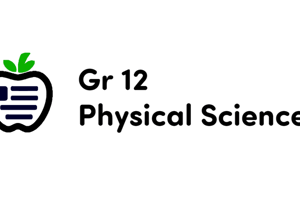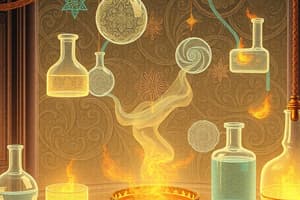Podcast
Questions and Answers
What is indicated by a negative value of ΔH in a chemical reaction?
What is indicated by a negative value of ΔH in a chemical reaction?
- The reaction has high activation energy.
- The reaction requires energy input to proceed.
- The reaction is endothermic.
- The reaction releases energy. (correct)
What happens to the enthalpy change when a reaction occurs exothermically?
What happens to the enthalpy change when a reaction occurs exothermically?
- ΔH becomes positive.
- ΔH remains constant.
- ΔH becomes negative. (correct)
- ΔH cannot be defined.
Under standard conditions, enthalpy changes are measured at which temperature?
Under standard conditions, enthalpy changes are measured at which temperature?
- 373 Kelvin
- 0 Kelvin
- 310 Kelvin
- 298 Kelvin (correct)
How is the relationship between the activation energies of the forward and reverse reactions expressed in terms of ΔH?
How is the relationship between the activation energies of the forward and reverse reactions expressed in terms of ΔH?
In an energy diagram of an exothermic reaction, which part represents the energy level of the products?
In an energy diagram of an exothermic reaction, which part represents the energy level of the products?
What characterizes an endothermic reaction?
What characterizes an endothermic reaction?
In the reaction $CH_4(g) + 2O_2(g) \rightarrow CO_2(g) + 2H_2O(g)$, what does the negative enthalpy change ($
abla H = -890 , kJmol^{-1}$) indicate?
In the reaction $CH_4(g) + 2O_2(g) \rightarrow CO_2(g) + 2H_2O(g)$, what does the negative enthalpy change ($ abla H = -890 , kJmol^{-1}$) indicate?
What is represented by $E_a$ on the energy graph of a reaction?
What is represented by $E_a$ on the energy graph of a reaction?
Which of the following statements is true regarding the energy changes during an endothermic reaction?
Which of the following statements is true regarding the energy changes during an endothermic reaction?
What defines the energy content of the reactants and products in a chemical reaction?
What defines the energy content of the reactants and products in a chemical reaction?
Flashcards
Thermochemistry
Thermochemistry
The branch of chemistry that studies the heat changes associated with chemical reactions and physical changes.
Enthalpy Change (ΔH)
Enthalpy Change (ΔH)
The energy change that occurs during a reaction, measured in kJ/mol. It's positive for energy absorption and negative for energy release.
Exothermic Reaction
Exothermic Reaction
A reaction that releases energy into the surroundings, causing the temperature to rise. The enthalpy change (ΔH) is negative.
Activation Energy (Ea)
Activation Energy (Ea)
Signup and view all the flashcards
Enthalpy Change (ΔH) in terms of Activation Energies
Enthalpy Change (ΔH) in terms of Activation Energies
Signup and view all the flashcards
Energy Profile Diagram
Energy Profile Diagram
Signup and view all the flashcards




